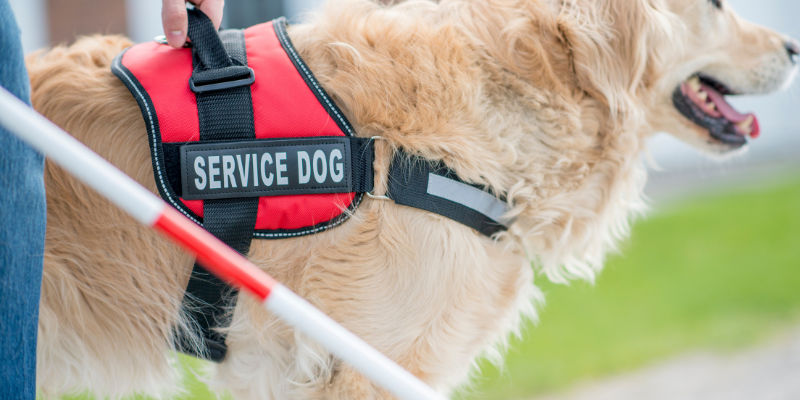Pets in rental properties? As a landlord, do you know your rights?
As a landlord, it shouldn’t come as a huge surprise that more and more renters want to rent a property that will accept their pets. Though Virginia doesn’t require you to accept pets in your rental property (outside of service or emotional support animals, which we’ll get to later), it’s up to you to decide whether it makes sense to accommodate tenants who are also looking for a home for their pet.
Whether or not you’re facing this decision right now, you’ll most likely have to deal with it at some point or another. We think it’s smart to go ahead and understand some details so when the time arises, you’ll know exactly what you’re dealing with.
Should you accept pets in your rental properties? Let’s start with some basics on different types of pets and what the state of Virginia says on the matter.
Table of Contents:
- Typical Household Pet
- Official Service Pets in Rentals
- Emotional Support Animals in Rentals
- Pet Rent for Rental Properties
- Acceptance of Pets in Rental Properties Virginia. Guidelines for Landlords with Regard to Pets
Typical Household Pets in Rental Properties

In most cases, tenants will want to find a place to live that is loving and accepting of their furry friend whom they consider to be a member of the family. Cats and dogs are the most common with the occasional other animal thrown in such as a bird or rabbit. The state of Virginia doesn’t require you to accept any type of pet, so whether you want pets in your rental property or not is totally up to you.
With a typical household pet, you can decide not only whether or not you’ll allow certain kinds of animals over others, but you can charge more in rent or deposits for allowing the pet to live in the home. With your typical household pet, anything is fair game for the landlord.
With a typical household pet, you can decide not only whether or not you’ll allow certain kinds of animals over others, but you can charge more in rent or deposits for allowing the pet to live in the home. With your typical household pet, anything is fair game for the landlord.
Official Service Pets in Rental Rroperties

According to the Americans with Disabilities Act (ADA) and subsequent Virginia Laws, people with physical and mental disabilities can bring service animals to all public places. You have most likely seen service animals on planes, at restaurants, at hotels, and other public places where someone might require such an animal.
While service animals might look and act like any other pet, the biggest indicator of a service animal (almost always a dog) is that they have been formally trained to assist their owner with certain tasks and typically wear a vest or bandana of some sort labeling them as such. Here are a few tasks that service animals might assist with:
- Assisting blind owners with navigation
- Alerting deaf owners of surrounding people or sounds
- Pulling a wheelchair
- Retrieving certain items that the owners can’t get themselves
- Providing any type of physical support to their owners
As a landlord, you are not allowed to discriminate against tenants based on their need for a service animal. According to the Fair Housing Act and Virginia law, tenants cannot be charged a higher rent or security deposit or face extra fees for having a service dog. However, if the dog causes damage in the home, the tenant is responsible for the cost of repairs.
More distinctions about Official Service Pets
- An official service pet is a dog that has been individually trained to do work or perform tasks for a person with a disability.
- These tasks can include, but are not limited to, guiding people who are blind, alerting people who are deaf, pulling a wheelchair, or alerting and protecting a person who is having a seizure.
- Service animals are not considered pets, so landlords cannot charge a pet deposit or pet rent for them. Landlords also cannot require that service animals be spayed or neutered, or that they have any vaccinations which are not required for all dogs.
If you have a tenant who is requesting to have a service animal in your rental property, you should ask for documentation from a doctor or other medical professional that verifies that the tenant has a disability, and that the disability is known to be alleviated by the presence of a service animal. You should also ask for documentation from a training program that verifies that the animal has been trained to perform the tasks that the tenant needs it to perform.
You should also ask for documentation from a training program that verifies that the animal has been trained to perform the tasks that the tenant needs it to perform.
Emotional Support Animals in Rentals

There might seem to be some overlap between emotional support animals and service animals, but while service dogs are formally trained, emotional support animals are not. An emotional support animal comforts its owner by providing them therapeutic companionship. The most typical situations that require emotional support animals are when people suffer from mental health problems such as depression, anxiety, PTSD, etc.
In order for a person to have an official emotional support animal they must have an ESA certificate signed by a mental health professional who is licensed in the state of Virginia. Simply owning a pet and saying that it’s an emotional support animal does not make it official. Unlike service animals, which are almost always dogs, emotional support animals can be any animal that the owner chooses, as long as they have a legitimate ESA certificate. Landlords should pay close attention to this as there are a number of websites where these certificates may be obtained for a nominal fee. There have been instances of tenants who have purchased one of these illegitimate certificates in order to avoid having to pay a Pet Deposit, which may be a thousand dollars or more.
It’s important to know that tenants with emotional support animals are legally entitled to live in any state without paying a pet fee or being declined because of their ESA. As a landlord, you are required to allow the tenant to have the official emotional support animal of their choice (no matter what the animal may be), and they cannot be charged an extra fee or deposit for having such an animal.
So now that you know exactly what to expect with everyday pets, service dogs, and emotional support animals, you get to decide what is best for your property.Here are a few things to consider when interviewing potential tenants who own a pet which is not a Service Animal or an ESA.
- You’ll have MUCH greater appeal by accepting pets.
- Did you know that more than 70% of renters own pets? That’s a very large share of the market and as a landlord, that number should be very important to you. If you are considering whether or not to rent your property to someone who has a pet, allowing pets will appeal to a huge portion of the market.
- In fact, nearly 60% of tenants said they would be way less likely to rent from a landlord that doesn’t allow pets. For most people with pets, living somewhere that won’t allow them to keep their animal is not an option.
By reaching a bigger share of the renter market, you’ll also have more options on finding the right tenant to live in your property. This is a really great option for most landlords.
So, it’s ultimately up to you to decide whether or not to allow ordinary pets in your rental property. If you do, you may be able to charge a higher rent and collect a larger security deposit to offset any damage the pet may cause.
There are however a few things that you should keep in mind.
- You should include a pet addendum in your lease agreement. This will spell out the rules and regulations for having a pet in your rental property.
- Emotional support animals are not considered to be pets under the law, and they are exempt from pet rent fees and pet security deposits.
- Official service animals are also exempt from pet rent fees and pet security deposits, andthey are allowed to live in “no pet” rental units.
If you have any questions about whether or not to allow pets in your rental property, or about the laws surrounding emotional support animals and official service pets, you should consult with an experienced landlord-tenant attorney.
Acceptance of Pets in Rental Properties in Virginia. Guidelines for Landlords with Regard to Pets
It can be a tough decision, as there are pros and cons to both allowing and not allowing pets.
Ultimately, it is up to you to decide what is best for your rental property. If you do decide to allow pets in your rental property, there are a few things you should keep in mind.
First, you should collect a larger security deposit. This will help to cover any additional wear and tear that a pet may cause on the property.
Second, you should require that all pets be current on their vaccinations and that they have a valid license. Finally, you should have a pet policy in place that outlines the rules and regulations regarding pets in the rental property.
If you have any questions about whether or not to allow pets in your rental property, or if you need help creating a pet policy, please contact us. We would be happy to help you make the best decision for your rental property.
If you’re a landlord in Northern Virginia, it’s important to understand the laws and regulations regarding pets in rental properties. There’s a lot to know about pets when it comes to managing rental properties, so it’s always a good idea to do your research and ask for professional advice if you find yourself in a tricky situation. So whether you’re deciding if you should allow pets or dealing with a current tenant pet situation, give us a call. We’re more than happy to help!
If you are ready to rent your home, don’t hesitate to take advantage of our exclusive FREE Rental Market Analysis. Finally, don’t forget to connect with us on social media! Follow us on Facebook, Twitter, LinkedIn, Instagram, and Pinterest for tips, ideas and updates.


